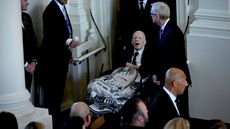Ten Things You Need to Know Today: 1 September 2023
The Week’s daily digest of the news agenda, published at 8am
- 1. ‘Panic’ over school buildings
- 2. ‘Golden era’ in cancer treatments
- 3. Tough sentence for Capitol rioter
- 4. Historic joint NHS strike
- 5. Russia and Iran invited back to Nobel Prize banquet
- 6. Ex-Tory MP demands name to be removed from slave trade study
- 7. Domestic violence ‘crisis’ in Spain
- 8. Debate over beer benefits
- 9. Suffolk town to be ‘bankless’
- 10. Legal delay for Dorries book
1. ‘Panic’ over school buildings
More than 100 schools in England are “scrambling to make arrangements” after being told to shut buildings because of crumbling concrete, said the BBC. With just days before the start of the new term, some pupils have already been told they will be learning remotely, in temporary classrooms or at different schools. Children “face a new lockdown” as the government reaches “panic mode” after “years of inaction” on the issue, said The Telegraph. Education Secretary Gillian Keegan said the decision followed “new evidence” about the material.
2. ‘Golden era’ in cancer treatments
UK cancer death rates have fallen by a quarter since the 1980s, thanks to a “golden era” of medical advances, said The Times. Breakthroughs in treatment, diagnosis and prevention have saved the lives of more than one million people, according to analysis by Cancer Research UK, which the charity said proved the disease was a “fixable problem”. A “one-size-fits-all formula” for cancer patients has been “gradually replaced by more bespoke treatments – helping survival rates reach an all-time high”, The Times added.
Five good-news cancer breakthroughs in 2023
Subscribe to The Week
Escape your echo chamber. Get the facts behind the news, plus analysis from multiple perspectives.

Sign up for The Week's Free Newsletters
From our morning news briefing to a weekly Good News Newsletter, get the best of The Week delivered directly to your inbox.
From our morning news briefing to a weekly Good News Newsletter, get the best of The Week delivered directly to your inbox.
3. Tough sentence for Capitol rioter
A Proud Boys leader has been sentenced to 17 years in prison. US Army veteran Joe Biggs, 38, was an “instigator” of the storming of the US Capitol on 6 January 2021, said prosecutors. The former Infowars correspondent was convicted of seditious conspiracy, among other charges. Although he pleaded for leniency and expressed remorse for his actions, he was handed one of the longest terms yet handed out over the US Capitol insurrection.
Capitol riot: what was going on in the White House?
4. Historic joint NHS strike
Junior doctors and consultants in England are set to strike together for the first time in the history of the NHS. In a “dramatic escalation” of their “bitter pay dispute with the government”, the joint industrial action will reduce hospitals and other services in England to providing “Christmas Day levels of care” for four days in September and October, said The Guardian. The British Medical Association blamed ministers’ refusal to negotiate over doctors’ salaries, but Rishi Sunak has criticised their demands as “unreasonable” and “unaffordable”.
Rishi Sunak’s NHS plan explained in five points
5. Russia and Iran invited back to Nobel Prize banquet
Russia and Belarus have been invited back to the Nobel Prize banquet after being excluded last year because of the war in Ukraine. Iran, which was not allowed to attend last year, has also been invited back to the event in Sweden. Explaining its decision, the foundation said it sought to include even those who did not share the values of the Nobel Prize, in the hope of increasing “dialogue”, but a Swedish MEP called the invites “extremely inappropriate”.
6. Ex-Tory MP demands name to be removed from slave trade study
A former Conservative MP has demanded her name be removed from Cambridge University research linking her family to the slave trade. Antoinette Sandbach was named by third-year PhD student Malik Al Nasir in a 2021 study into 19th-century slave owner Samuel Sandbach. He said that he and the university have been contacted by Sandbach’s legal representatives, calling on him to remove her from his work. Writing on Twitter, the former MP said that her concerns were related to personal safety and the mention of a family property in Al Nasir’s study.
Slavery and the monarchy: time for a royal reckoning?
7. Domestic violence ‘crisis’ in Spain
Spain has called a crisis meeting after the rise in the number of women being murdered in acts of domestic violence. Education minister Pilar Alegría called August a “black month” after seven domestic murders, with 18 of the 40 women who died this year in acts of gender-based violence killed in June, July and August. This has “revived an angry political debate” over the hard-right Vox party’s “denial of gender violence”, which “some experts say has contributed to the deaths”, said The Times.
8. Debate over beer benefits
Drinking the “odd pint” of beer may be good for your gut health and boost the immune system, a review suggests. Researchers said that although the purported health benefits of alcohol “are controversial”, sensible consumption of beer has a “positive effect on the regulation of human immune function”. They said beer boosts the body’s immune system because of a collection of healthy bacteria that benefits the gut. However, Naveed Sattar, professor of cardiovascular and metabolic health at the University of Glasgow, told The Telegraph the study “misses the bigger picture”.
What level of alcohol is safe?
9. Suffolk town to be ‘bankless’
The seaside town of Southwold in Suffolk will be left without a bank when Barclays closes its final branch there in November. Locals will still be able to get cash from the local Post Office, but the nearest branch of Barclays will now be in Lowestoft, a 30-minute drive away. The lender said it decided to close its Southwold outlet after noting that just 17 people used the branch as their only source of banking. There are approximately 5,000 bank branches in the UK, “just a quarter of the 20,000 that were open at the turn of the century”, noted The Telegraph.
10. Legal delay for Dorries book
Nadine Dorries’s book will be delayed until November because of legal issues, its publisher has announced. The former culture secretary, who resigned as an MP last weekend, has been writing a book on Boris Johnson, which had been scheduled for release on 28 September, but will now be published on 9 November, Harper Collins said. The publisher added that a “small delay is necessary” to allow for the “huge volume of material the author has consulted”, the “number of high-level sources spoken to” and the “required legal process needed to share her story”.
Nadine Dorries and four of the other weirdest Westminster exits

Continue reading for free
We hope you're enjoying The Week's refreshingly open-minded journalism.
Subscribed to The Week? Register your account with the same email as your subscription.
Sign up to our 10 Things You Need to Know Today newsletter
A free daily digest of the biggest news stories of the day - and the best features from our website
-
 10 things you need to know today: December 1, 2023
10 things you need to know today: December 1, 2023Daily Briefing Fighting resumes as the Gaza truce ends, New York appeals court reinstates Trump gag order, and more
By Harold Maass, The Week US Published
-
 Ten Things You Need to Know Today: 1 December 2023
Ten Things You Need to Know Today: 1 December 2023The Week’s daily digest of the news agenda, published at 8am
By The Week UK Published
-
 10 things you need to know today: November 30, 2023
10 things you need to know today: November 30, 2023Daily Briefing Israel and Hamas extend their truce at least 1 more day, Henry Kissinger dies at 100, and more
By Harold Maass, The Week US Published
-
 10 things you need to know today: November 29, 2023
10 things you need to know today: November 29, 2023Daily Briefing Hamas release 12 more hostages, Jimmy Carter emerges from hospice care to attend Rosalynn Carter's memorial service, and more
By Harold Maass, The Week US Published
-
 10 things you need to know today: November 28, 2023
10 things you need to know today: November 28, 2023Daily Briefing Israel and Hamas extend their cease-fire, Trump urges appeals court to keep blocking gag order, and more
By Harold Maass, The Week US Published
-
 10 things you need to know today: November 27, 2023
10 things you need to know today: November 27, 2023Daily Briefing Israel and Hamas consider extending truce, 3 Palestinian students are shot in Vermont, and more
By Harold Maass, The Week US Published
-
 10 things you need to know today: November 26, 2023
10 things you need to know today: November 26, 2023Daily Briefing US citizen expected to be among third round of hostages released by Hamas, Israeli oil tanker reportedly seized off Yemen’s coast, and more
By Justin Klawans, The Week US Published
-
 10 things you need to know today: November 25, 2023
10 things you need to know today: November 25, 2023Daily Briefing Israel and Hamas to participate in second prisoner swap, Russia launches largest drone attack since the beginning of war, and more
By Justin Klawans, The Week US Published










